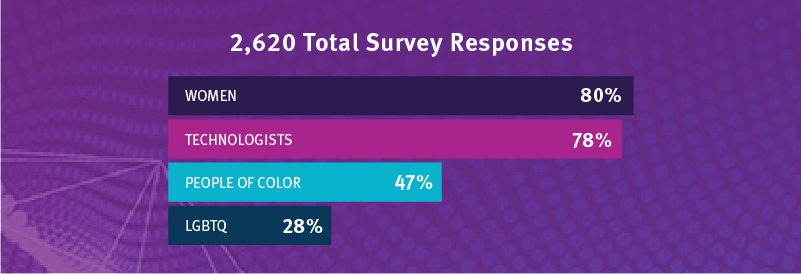Historically, disasters have had a disproportionately negative impact on women, and women have taken longer to recover from the effects.[1] Furthermore, during times of economic downturn, many companies cut back on their efforts to promote diversity, equity, and inclusion, jeopardizing the already low representation of women in technology.[2][3] Representation of intersectional women in technology is critical to ensuring that technology is focused on the needs of women around the world as they deal with and recover from COVID-19.
AnitaB.org conducted the Technical Equity Experience (TechEES) Global COVID-19 Impact Pilot Survey between March 27, 2020, and April 6, 2020, to understand the unique impact of COVID-19 on technical women. This survey was a pilot intended to shape future ongoing research that will be used to help the computing and technical ecosystem cope with COVID-19 and the economic downturn. The survey examined COVID-19-related changes in personal experiences with work, school, domestic life, and health & wellbeing, as well as institutional support needed by women technologists to help cope with COVID-19 and the economic downturn. The survey had 2620 total responses: 80% women, 78% technologists, 47% people of color, and 28% LGBTQ. This report outlines the findings of the survey, as well recommendations for policy makers and workplaces to best support women technologists.

Findings Overview
Technologists
Women technologists are experiencing increased levels of job insecurity, with 46% stating that they are worried about losing their job, and 21% reporting that it is likely they will lose their job. Furthermore, women are concerned about their ability to find a new job – 43% of women technologists and 57% of underrepresented minority (URM)[4] women technologists report that if they lost their job, it would be hard to find a new one.

Employed women report cost-cutting measures at their places of work, including hiring freezes (50%), rescinded or canceled internships (39%), lay off or furloughs (22%), reductions in benefits (21%), and wage reductions (19%).

Despite cost-cutting measures, 81% of women technologists approve of how their places of work have responded to COVID-19 with the most cited supportive actions being (1) remote work, (2) flexible schedules, increased paid leave, and other measures intended to support employees’ increased domestic responsibilities, and (3) transparent & frequent communications from leadership.
All technical women have seen an increase in domestic labor of an average of 9 hours per week. This number is significantly linked to being a caregiver, number of kids, being a member of an underrepresented minority group, and sexual orientation.

In addition to dealing with increased domestic labor, women technologists are experiencing further complications with their jobs as a result of the COVID-19 outbreak including increased workload from employer (32%), decreased productivity (41%), decrease in ability to concentrate (46%), and decrease in uninterrupted work hours (29%).
52% of women technologists report a decline in mental health and 32% report a decline in physical health.

Women technologists report increases in fear, numbness, or stress (67%), stress about personal finances (61%), and loneliness (57%).
Technology Students
Women technology students report impacts to their job opportunities: 28% of students and 45% of URM students report being laid off from an internship or job due to the COVID-19 pandemic. Of women technology students who had job offers prior to the outbreak of COVID-19, 31% have had offers postponed or rescinded, and an additional 50% are afraid this will happen. Similarly, 25% of students who had internship offers have had those offers postponed or rescinded, and 59% are concerned this will happen.

33% of women technology students say that COVID-19 may delay their ability to graduate.

International women technology students are struggling more than domestic students with needs that were previously provided by their schools, such as internet, food, and shelter. International students have 6.2 times the risk of domestic students for homelessness during the COVID-19 pandemic, and they point to their lack of local social support as a primary reason for their vulnerability during this time.
Click here to view the complete Technical Equity Experience (TechEES) Global COVID-19 Impact Pilot Survey Report.
Footnotes
[1] – Wenham, C., Smith, J., & Morgan, R. COVID-19: The gendered impacts of the outbreak. The Lancet 395, 846-848 (2020).
[2] – Hogarth, T., Owen, D., Gambin, L., Hasluck, C., Lyonette, C., & Casey, B. The equality impacts of the current recession (2009).
[3] – NCWIT. By the numbers. (2020) https://ncwit.org/resource/bythenumbers/
[4] Underrepresented minority groups (URM) include individuals identifying as: Black/African American, Hispanic/Latinx, American Indians/Native Americans/First Nations, or Pacific Islander/Native Hawaiian. For more info: AnitaB.org, “Toward greater representation and equity in tech” (2018).

